Prof. dr. Tom Breugelmans
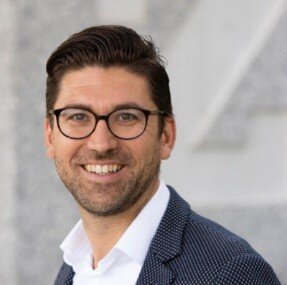
Prof. Tom Breugelmans is a Full Professor and Dean of the Faculty of Applied Engineering at the University of Antwerp. He earned his PhD in Engineering Science at the Vrije Universiteit Brussel (2004–2010), followed by postdoctoral research and an assistant professorship at Artesis Hogeschool Antwerpen. He joined the University of Antwerp in 2014 and now leads the Applied Electrochemistry and Catalysis (ELCAT) research group.
His research centers on electrocatalysis and electrochemical reactor design for sustainable chemical manufacturing. Key themes include CO2 electrolysis, development of scalable electrolyzer architectures, and reactor engineering for large-scale electrification of industrial processes. The group investigates catalyst–reactor interactions, flow-field optimization, and integration of electrochemical systems with renewable power sources to reduce the carbon footprint of chemical production.
In 2023, Prof. Breugelmans received a European Research Council (ERC) Consolidator Grant to develop next-generation CO₂ electrolyzers. He supervises a large interdisciplinary team and has authored more than 100 peer-reviewed papers in journals such as ACS Energy Letters, Applied Catalysis B, and Chemical Engineering Journal. He also coordinates national and international projects with both academic and industrial partners.
Prof. dr. Marc Koper
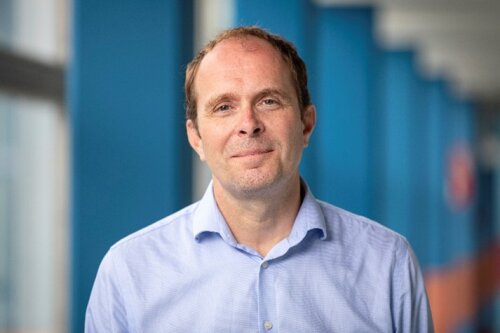
Marc Koper is Professor of Surface Chemistry and Catalysis at Leiden University, The Netherlands. He received his PhD degree (1994) from Utrecht University (The Netherlands) with a thesis on nonlinear dynamics and oscillations in electrochemistry. He was an EU Marie Curie postdoctoral fellow at the University of Ulm (Germany) and a Fellow of Royal Netherlands Academy of Arts and Sciences (KNAW) at Eindhoven University of Technology, before moving to Leiden University in 2005. His research in Leiden focuses on fundamental aspects of electrocatalysis, theoretical and computational electrochemistry, and electrochemical surface science, in relation to renewable energy and chemistry. He has received various national and international awards, among which the Spinoza Prize of the Netherlands Organization for Scientific Research (2021), the Allen J. Bard Award for Electrochemical Science of The Electrochemical Society (2020), the Netherlands Catalysis and Chemistry Award (2019), and the Faraday Medal (2017) from the Royal Society of Chemistry. He also holds an honorary degree from the University of Antwerp. He was President of the International Society of Electrochemistry in 2021-2022.
Prof. dr. Gabriele Centi
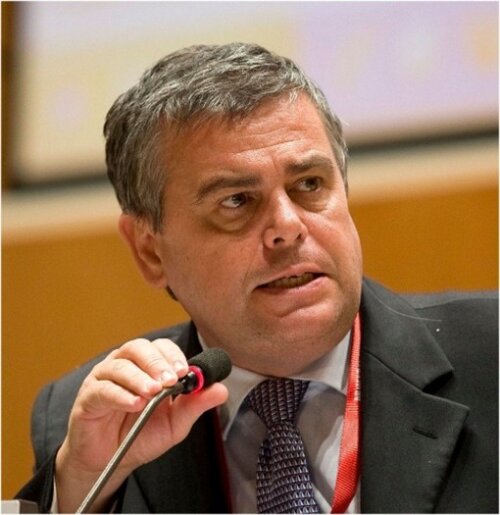
Gabriele Centi is a Full Professor of Industrial Chemistry at the University of Messina, Italy, and President of the European Research Institute of Catalysis (ERIC). He was the coordinator of the EU Network of Excellence IDECAT and is the past President of IACS (International Association of Catalysis Societies). Previously, he served as the President of EFCATS (European Federation of Catalysis Societies). He has served as the coordinator or PI in over 30 EU projects. He recently initiated and coordinated an ERC Synergy project SCOPE on plasma catalysis. The research interests encompass the fields of applied heterogeneous catalysis, sustainable energy and chemical processes, with recent focus on the development of catalytic technologies for solar fuels, carbon circularity, and the electrification of chemical production. He has received numerous awards, the last being the EFCATS & APCATS Award M. Che in 2025. He chaired several international conferences, the last being the International Conference on Environmental Catalysis (2025). He is the author of over 650 scientific publications and 18 books and is editor of the Journal of Energy Chemistry.
Prof. dr. Amanda Garcia

Prof. dr. Amanda Garcia is an electrochemist. She obtained her PhD in Brazil at the University of São Paulo with an internship at the Institute Polytechnique de Grenoble-France. She did her postdoc in Brazil, France, and The Netherlands (University of Leiden). She worked at TNO (Dutch Institute for Applied Sciences) as a scientist leading the Power to Specialties research line. In 2020, she was awarded by the Electrochemical Conversion and Materials (ECCM) Dutch program to develop her own research as Assistant Professor at the University of Amsterdam, leading the group of electro-catalytic synthesis. Her research focuses on investigating reaction conditions at the atomic and mechanistic level by using in situ spectroscopic techniques.
Prof. dr. David Vermaas
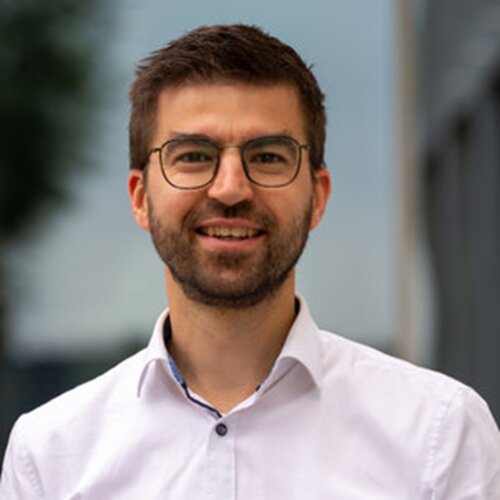
Prof. dr. David Vermaas is an associate professor at TU Delft and leads a research group on electrochemical process technology. David obtained a PhD degree from the University of Twente (2014) on flow dynamics and ion exchange membranes for reverse electrodialysis. His research group studies mass transfer and membrane development for electrochemical applications, ranging from electrolysis, flow batteries and CO2 capture. David received an ERC Starting Grant (2019) on mass transfer in CO2 electrolysis, an NWO Vidi grant (2023) on multilayer membrane development, coordinated the EU project MELODY (2020-2025) on H2-based flow batteries and coordinates the research on AEMWE in the HyPRO project. He received an EFCE Excellence Award in 2015 and the Waterman Sustainability Award in 2018. David also co-founded the flow battery company AQUABATTERY and the CO2 capture company SeaO2.
Dr. Günther Schmid
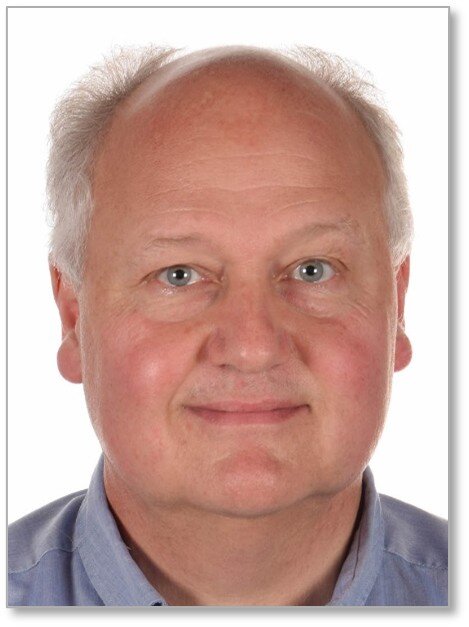
Dr. Günter Schmid is a Lead Technical Expert in Siemens Energy Global GmbH & Co. KG. He earned his PhD degree in 1993 from the University Ulm (Germany) in organometallic chemistry and crystallography. He joined 1994 Texas A&M University (USA) for a postdoctoral position. Since 1996, he has been working within the industrial framework of Siemens companies like Siemens Energy, Siemens AG, Infineon AG and Osram in various positions.
He started in the semiconductor industry. Around 2010, he began working on energy storage materials and electrochemical synthesis, including the electrochemical reduction of CO2 and water electrolysis, with interests in electrocatalysts and industrial electrode and electrochemical cell design. Recently, he has focused on aging in Megawatt PEM electrolyzers and implementing anion exchange membranes in industrial-scale systems.
G. Schmid received fellowships from the “Studienstiftung des Deutschen Volkes” and the “Humboldt Stiftung”. In 2004, he received the GMM award from VDE. In 2009, he became Inventor of the Year. In 2021, he was elected a Fellow of IAAM, and in 2023, he received the IAAM Scientist Medal.
Prof. dr. Joris Proost
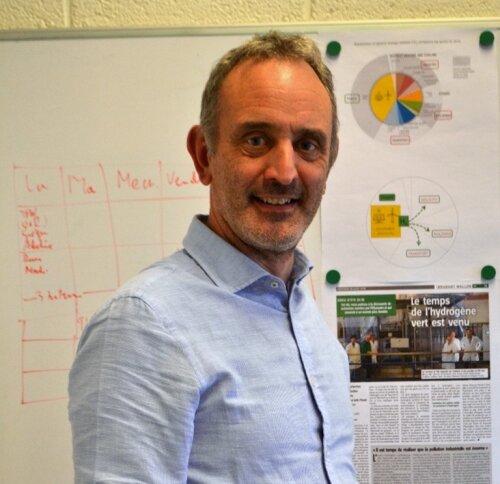
Prof. dr. Joris Proost holds a Master and PhD in Metallurgical and Materials Engineering from Louvain University (KULeuven) in 1994 and 1998, respectively. After spending 3 years at Harvard University with Prof. Frans Spaepen, he joined the Engineering School of Louvain University at Louvain-la-Neuve (UCLouvain) in 2003, where he has been a tenured Full Professor since 2009. His current research interests at UCLouvain focus on electrochemical process intensification, with a particular interest in developing new reactor and 3-D electrode concepts for green hydrogen production from renewable water electrolysis.
Apart from his academic work at UCLouvain, Prof. Proost has also been the Belgian representative within the Hydrogen Technology Collaboration Program (TCP) of the International Energy Agency (IEA) from 2015 to 2025. He was also invited as one of 3 academic experts to the high-level strategic IEA Hydrogen Workshop in February 2019 in Paris, and acted as a Peer Reviewer of the resulting seminal report "The Future of Hydrogen" that was launched mid-June 2019 on the initiative of the Japanese Government at the meeting of the G20 energy ministers in Tokyo. He has been invited since to contribute to several other hydrogen flagship publications of the IEA: "Energy Technology Perspectives, the world’s guidebook on clean energy technologies", "Hydrogen in the Northwest European region, a vision towards 2030", and "The Global Hydrogen Review (2021, 2022, 2023)". In addition, he has been asked as an international expert to advise on the deployment and operation of the International Hydrogen Energy Center (IHEC), created in June 2021 by UNIDO, the United Nations Industrial Development Organisation.
Prof. dr. Nejc Hodnik
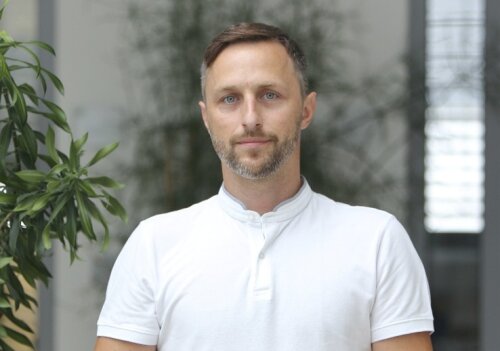
Prof. dr. Nejc Hodnik is head of the Laboratory for Electrocatalysis (ElectroCat) at the National Institute of Chemistry in Ljubljana, senior researcher at the Institute of Metals and Technology, and professor at the University of Nova Gorica. He earned his PhD from the University of Ljubljana in 2013 and continued his research as a Marie Curie IEF Fellow at the Max Planck Institute in Düsseldorf (2014–2016). His work focuses on electrocatalysis for fuel cells and electrolyzers, with key contributions to nanomaterials, advanced electrochemical methods, and nanoscale electrocatalyst stability. Prof. Hodnik has authored over 120 scientific articles (h-index 39), holds several patents, and has supervised more than 10 PhD students. He leads several research projects, including an ERC Starting Grant, two NATO SPS, and several national ARIS projects focusing on electrochemical energy conversion, nanotechnology and sustainable technologies.
Dr. Raymond Thür
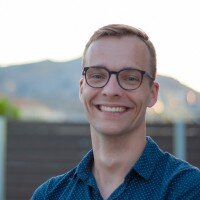
Dr. Raymond Thür is a distinguished R&D Project Manager at Agfa-Gevaert NV, where he spearheads the development of advanced membrane technologies within the Zirfon division. His work is central to the industrialization of high-performance separators used in alkaline water electrolysis, a critical component in the global transition toward green hydrogen production. Beyond his industrial leadership, Dr. Thür is a key contributor to the CLEANHYPRO project, an Open Innovation Test Bed (OITB) designed to accelerate the hydrogen value chain. He holds a PhD from KU Leuven, where his academic research focused on the synthesis and optimization of mixed-matrix membranes (MMMs), specifically integrating metal-organic frameworks (MOFs) to enhance gas separation efficiency. Through a combination of rigorous materials science and large-scale industrial application, Dr. Thür has become a leading voice in membrane innovation, dedicated to creating scalable, sustainable solutions for energy-efficient industrial processes.